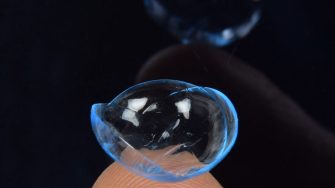
The Research in Orthokeratology (ROK) Group in the School of Optometry & Vision Science at UNSW has received funding from the Australian Government and contact lens industry partners over several years. Our research aims to develop new products for OK, and to deepen our understanding of the corneal tissue response to overnight OK so that the procedure can be made as safe and effective as possible.
Our current research involves the following studies:
- Short-term lens-wearing trials: experimental lenses are worn in the open eye from 15 minutes to 4 hours. You would need to be available during the day and be prepared to come to UNSW to participate in these studies.
- Overnight lens-wearing trials: once the lens designs have been optimised based on short-term lens-wearing trials, we will ask subjects to wear experimental lenses overnight during sleep. We’ll need to assess the lenses soon after eye opening, so it would be best if you live close to the UNSW campus at Kensington.
- Following on from the short-term and overnight trials, we will recruit subjects to wear lenses in the “real world” for periods ranging from two weeks up to three or more months. Lenses will be individually tailored to each subject’s eyes and will be worn during sleep only. We will require you to attend our clinic on the UNSW campus for regular check-ups and measurement sessions during these dispensing studies.
Can OK lenses be used to correct presbyopia?
We are currently recruiting subjects aged between 45 and 60 who require glasses for reading and near work only, to test novel OK lens designs for the correction of presbyopia.
Developing an OK lens design to correct corneal astigmatism
Preliminary research is underway to investigate the performance of OK lenses on eyes that have high degrees of corneal astigmatism or irregularity. Results from these preliminary studies will guide the development of lens designs to correct astigmatism through corneal reshaping.
The effect of OK lens wear on corneal sensitivity and corneal nerve morphology
We will soon be recruiting myopic subjects to wear OK lenses for myopia correction for up to three months. During this period of lens wear we will monitor the sensitivity of the cornea and capture maps of the corneal nerves using sophisticated imaging technology.
Harnessing contact lens design to optimise optics and vision in OK
Novel sophisticated instrumentation and mathematical models are providing us with insights into subtle lens design changes that might improve the subjective visual quality experienced by wearers of OK lenses for myopia, hyperopia and presbyopia.
Optical aberrations for myopia correction and control
Following on from our work demonstrating that OK lens wear may slow myopia progression in children, we will soon conduct studies with the aim of manipulating lens design and optimising the corneal reshaping process to maximise the myopia control effect for individual children.
